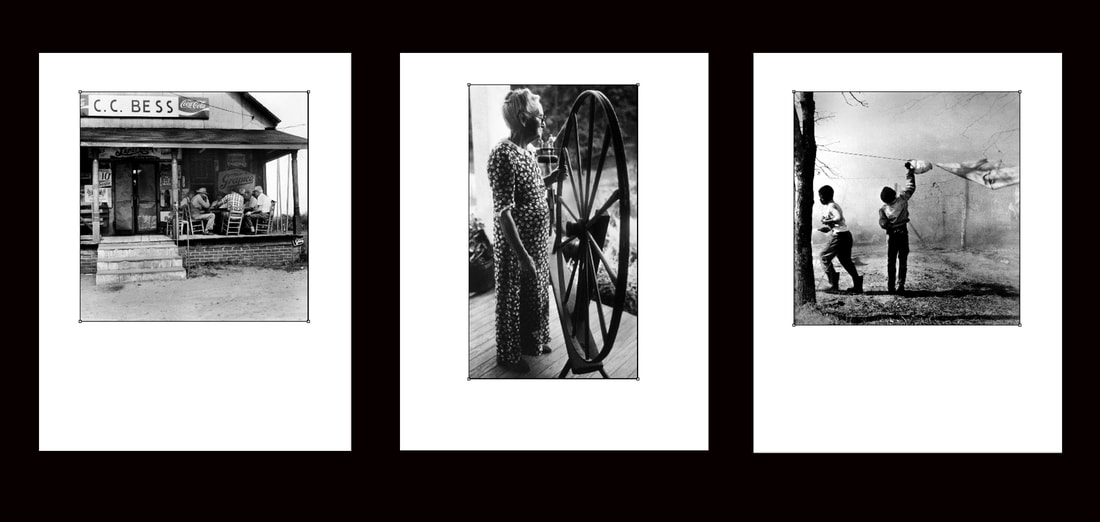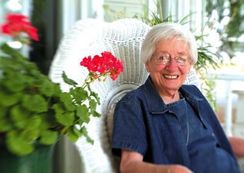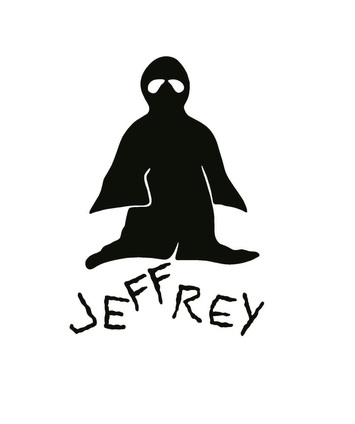"LIKE ANOTHER FINE SOUTHERN WRITER, EUDORA WELTY, MRS. WINDHAM USED PHOTOGRAPHY AS AN EXTENSION OF HER STORYTELLING, BRINGING TO THE EYE IMAGES THAT TRIGGER THE IMAGINATION." - THE BIRMINGHAM NEWS
|
|
|
The photograph of the Woman with Spinning Wheel, shown below, was taken by the camera that Kathryn is talking about in this story
CLICK an IMAGE TO SEE THE STORY BEHIND EACH Photograph (Or order a print)
|
These six Kathryn Tucker Windham giclée photographs are printed on a 17 x 22 inch sheet of archival museum quality paper. Each image is positioned on the print allowing for a balanced placement using the white space surrounding it.
A gold certificate with Kathryn's signature is embossed at the bottom of each print, and a certificate is included from the Windham family as proof of authenticity. The title and edition number is hand written on the print as well. The "story" behind each image, told my Kathryn, is provided on the printed certificate which is included with each print. Your satisfaction is guaranteed. |
Examples of image placement on prints
|
To celebrate their 50th anniversary in 1930, the Kodak company distributed Brownie cameras free to children who were 12 years old. My mother was among those lucky pre-teens. As soon as she received her Brownie, Mother began making photographs, and, though the camera models changed, she never stopped photographing until shortly before her death in 2011.
Mother was keenly aware of a changing South through the mid part of the 20th century. It was often those images of disappearing sights that she viewed through the lenses of her cameras. Backyard haircuts, old soldiers, children gathered for storytelling, mongrel dogs, country shanties, basket weavers, women at spinning wheels and the like captured her fancy, and she captured their likenesses on film.
Mother stored her hundreds of negatives in an old wooden file box. She thought nothing of them other than that they were the biproduct of a hobby she enjoyed. One day a well-known Alabama historian was visiting Mother at her home in Selma. The woman was intrigued---even astounded---to see the collection of photography Mother had amassed through the years.
Soon Mother’s photography was the subject of exhibits in museums around the state. She gave talks about people and places in her photographs, recalling conversations struck up in the course of her picture-taking. As she told it, “Suddenly I have a whole new vocation. Somebody told me that now I’m a photographer, so I guess I am!” --Dilcy
Mother was keenly aware of a changing South through the mid part of the 20th century. It was often those images of disappearing sights that she viewed through the lenses of her cameras. Backyard haircuts, old soldiers, children gathered for storytelling, mongrel dogs, country shanties, basket weavers, women at spinning wheels and the like captured her fancy, and she captured their likenesses on film.
Mother stored her hundreds of negatives in an old wooden file box. She thought nothing of them other than that they were the biproduct of a hobby she enjoyed. One day a well-known Alabama historian was visiting Mother at her home in Selma. The woman was intrigued---even astounded---to see the collection of photography Mother had amassed through the years.
Soon Mother’s photography was the subject of exhibits in museums around the state. She gave talks about people and places in her photographs, recalling conversations struck up in the course of her picture-taking. As she told it, “Suddenly I have a whole new vocation. Somebody told me that now I’m a photographer, so I guess I am!” --Dilcy
|
"Some people are important to intellectuals, journalists, or politicians, but Kathryn Tucker Windham is probably the only person I know in Alabama who is important to everybody."
–Wayne Flynt, Professor Emeritus in the Department of History at Auburn University. |
CONTACT US
Dilcy Windham Hilley Email: [email protected] © 2023 - Dilcy Windham Hilley. All rights to images belong to the artists who created them. Site by Mike McCracken [email protected] |


